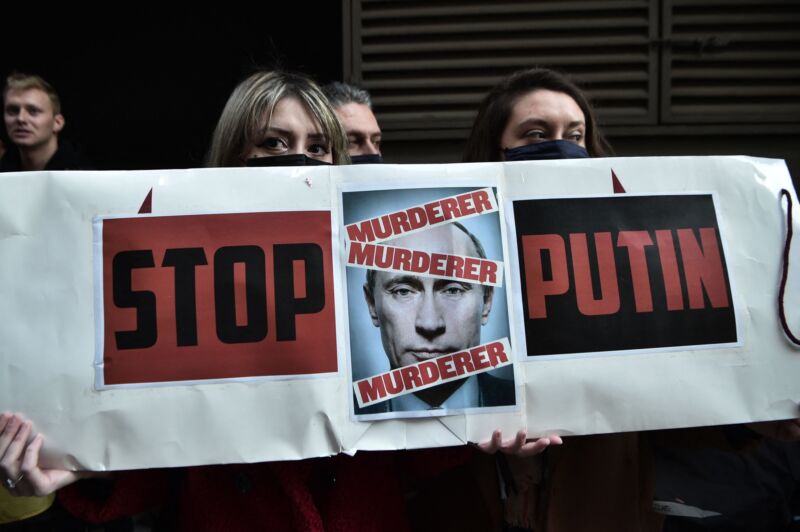
In response to Russia's invasion of Ukraine, the US and allies are imposing sanctions that "will cut off more than half of Russia's high-tech imports, restricting Russia's access to vital technological inputs, atrophying its industrial base, and undercutting Russia's strategic ambitions to exert influence on the world stage," the White House said on Thursday. The sanctions are a "response to Putin's war of choice against Ukraine" and "impose severe costs on Russia's largest financial institutions," the White House said.
For exports to Russia, "US companies must now obtain licenses to sell computers, sensors, lasers, navigation tools, and telecommunications, aerospace, and marine equipment. The United States will deny almost all requests," a Reuters article explained. "The new rules also force companies making tech products overseas with US tools to seek a US license before shipping to Russia," Reuters wrote, noting that similar restrictions were previously applied to Chinese tech giant Huawei.
According to the White House announcement, "countries that adopt substantially similar export restrictions are exempted from new US licensing requirements for items produced in their countries." The European Union, Australia, Japan, Canada, New Zealand, and the United Kingdom are imposing similar sanctions.
Tech-specific export restrictions
Tech-specific sanctions target chips, telecom, security, and more, the White House said:
Russia-wide restrictions to choke off Russia's import of technological goods critical to a diversified economy and Putin's ability to project power. This includes Russia-wide denial of exports of sensitive technology, primarily targeting the Russian defense, aviation, and maritime sectors to cut off Russia's access to cutting-edge technology. In addition to sweeping restrictions on the Russian-defense sector, the United States government will impose Russia-wide restrictions on sensitive US technologies produced in foreign countries using US-origin software, technology, or equipment. This includes Russia-wide restrictions on semiconductors, telecommunication, encryption security, lasers, sensors, navigation, avionics and maritime technologies. These severe and sustained controls will cut off Russia's access to cutting edge technology.
Regarding military-specific restrictions, the White House said that "Exports of nearly all US items and items produced in foreign countries using certain US-origin software, technology, or equipment will be restricted to targeted military end users. These comprehensive restrictions apply to the Russian Ministry of Defense, including the Armed Forces of Russia, wherever located."
A Commerce Department fact sheet on the license rules said the US is imposing "a policy of denial" for license applications but will conduct case-by-case reviews for "applications related to safety of flight, maritime safety, humanitarian needs, government space cooperation, civil telecommunications infrastructure, government-to-government activities, and to support limited operations of partner country companies in Russia."
Tough sanctions on Russian banks
The Biden administration said it is "cutting off Russia's largest bank from the US financial system" and imposing "full blocking sanctions on Russia's second largest bank—freezing any of its assets touching the US financial system." There are also "full blocking sanctions" on three other major Russian financial institutions and certain "Russian elites... who have enriched themselves at the expense of the Russian state, and have elevated their family members into some of the highest position of powers in the country."
The US Treasury Department posted more details on the financial sanctions here.
Meanwhile, Russia's invasion of Ukraine could cause problems for chip manufacturing. "Ukraine is a major producer of neon gas critical for lasers used in chipmaking and supplies more than 90 percent of US semiconductor-grade neon, according to estimates from research firm Techcet," Reuters reported. "About 35 percent of palladium, a rare metal also used for semiconductors, is sourced from Russia. A full-scale conflict disrupting exports of these elements might hit players like Intel, which gets about 50 percent of its neon from Eastern Europe according to JPMorgan."
reader comments
761